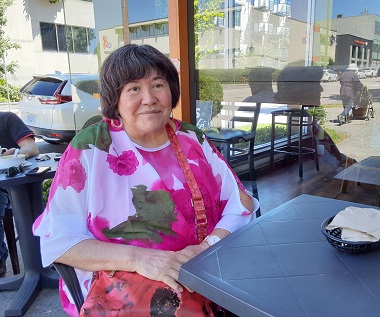
Frances Carlick heard Pope Francis apologize in person. She believes strongly in the healing power of forgiveness.
Frances Ceen-ne Carlick is happy that Pope Francis will be coming to Canada July 24 – 29, but she probably won’t make the trip to Edmonton to greet him.
In fact, she has already seen him, at the Vatican. The Vancouver resident was a member of the delegation of First Nations, Inuit and Métis residential school survivors who met with the pope April 1.
Healing journey
Carlick described that visit to her church – Vancouver Eastside Vineyard (VEV) – in an April 10 video.
She said she was surprised how far the delegates had to walk: “You have to walk for miles in the Vatican . . . I was just huffing and puffing by the time we got into the room where we were meeting with the pope.”
But she was expectant. She felt she had been assured by the Holy Spirit that the pope would apologize, even before that was certain, and had been encouraging other delegates to have confidence that it would happen.
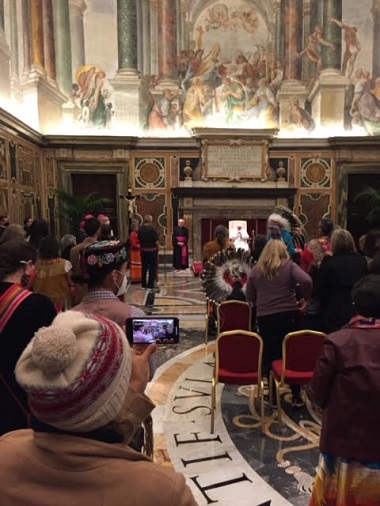
First Nations, Metis and Inuit delegates meeting with Pope Francis April 1.
Carlick found the experience very moving, and it confirmed her expectation. The pope spoke in Italian, but delegates had a copy of his apology printed for them in English.
She said:
He mentioned some really beautiful things about our traditional wisdom. The tree of life, that really touched me – that the tree is rich in fruit, even though we’ve experienced tragedy, which many of us have.
He talked about colonization, and he also shared that he felt shame and sorrow for what the role of the Catholic church had done to so many of us in Canada. He shared that these were all things contrary to the gospel of Jesus Christ. That really, really hit me.
He said, I ask for God’s forgiveness and I want to say to you with all my heart I am very sorry. I was rejoicing in my spirit – that it finally happened, and I got to witness it. I just couldn’t thank our church enough. It was just so profound.
I was there for my mom. I was there for my late husband. I was there for my uncle and my aunt and all the people.
There were two sets of delegates on the trip – those who spoke with Pope Francis and those who were there for support; Carlick was in the second group. The delegations mingled though, and became “like family to me.”
Respect Catholics
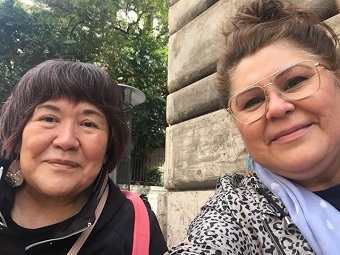
Frances Carlick became friends with Joanna Landry on the trip.
Spending time with her fellow delegates led Carlick to another powerful experience. When delegates were invited to share their experiences in the church at the burial site of St. Francis, she said:
I was just amazed how strong many of our delegates were as Catholics. That really surprised me, because I stopped going to church, I stopped following that path because I believed in being born again as a Christian. . . .
The drummers and singers went to the front from the Squamish Nation [also Musqueam and Chehalis]. So they drummed and sang – it was just so holy. I just wanted to weep, it was so profound to hear the drumming in that big cathedral.
Then they called up fluent speakers who prayed and read the gospel in their own language – like the Cree language and the French Métis language, and the Inuit. It just blew me away; I was just so surprised.
I had to double check myself, because it was almost like I was, in my head, mocking. The Lord really had to humble me, to bring me back and say, the Catholic church deserves respect too. I learned something from the Holy Spirit there, that even though I had forgiveness, there was still this mocking voice in my head that God had to correct. So that was really profound for me.
Carlick became particularly close with Joanna Landry, Superintendent of Education Services for Regina Catholic Schools.
Residential school
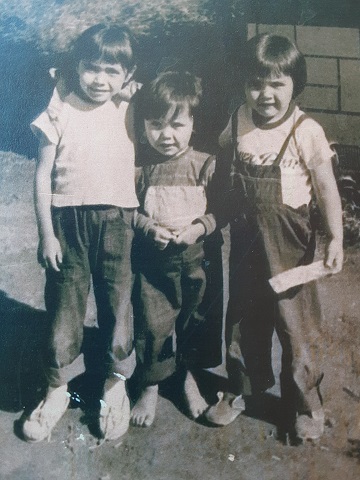
Frances Carlick (left), with her brother Walter and sister Bernice.
That Carlick experienced a persistent mocking voice is not surprising. Her family suffered mightily at the residential schools they attended.
She and her siblings attended Lower Post Residential School (which only opened in 1951), just south of the BC/Yukon border, while her mother’s family went to Lejac Residential School further south.
Carlick was student #155. She started at the school in September 1957, at age seven, and attended until 1964. Then she was “shipped to” Coudert Hall to attend Catholic high school.
“The nuns [at Lower Post] were so harsh,” she told me. “Daily harsh.” She particularly feared having to clean the gym and chapel, both “large spooky dark rooms,” on her own, while nuns would check in on her from time to time to make sure she was working hard.
She does remember Miss Jacqui fondly, describing the American teacher who taught them ballet and tap dancing – and, against the wishes of the nuns, encouraged them in their Native dancing – as “my saving grace.”
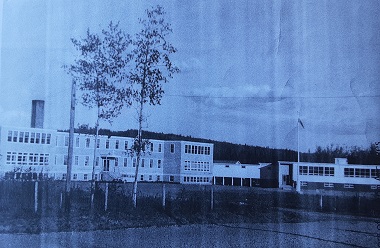
Frances Carlick lived for several years in dormitories on the top two floors (far left) of Lower Post Residential School.
Possibly the worst part for Carlick, ironically, was the fact that she was educated in her own community.
Students, who came from all over Yukon, were not allowed to visit their families during the school year.
In her case, even though she was on the outskirts of her own small community, the only contact permitted was a one-hour weekly visit by her mother on Sunday afternoon.
“We were basically in prison,” she said. “We pined for home.” They would search the roads from their dormitory windows for signs of people they knew.
Carlick’s late husband, Kirby Dick, went to the notorious Kuper Island Residential School (near Chemainus), subject of a current CBC podcast series, and also to St. Mary’s Indian Residential School in Mission.
Traumatized
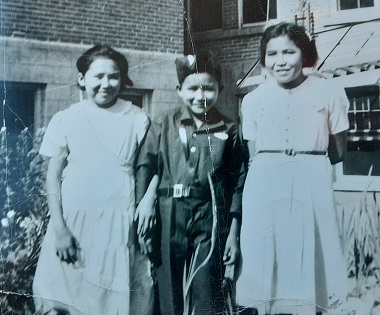
Frances Carlick’s mother Lorna Reid (at right) with her sister Hannah and brother Walter at Lejac Indian Residential School.
Carlick’s mother, Lorna Reid and her two siblings, Hannah and Walter, attended Lejac Residential School, west of Prince George, in the 1940s.
Walter, the youngest, never returned home to Telegraph Creek.
“What’s so terrible is how they denied what happened, and said he died of meningitis,” she told me.
In was only in 2012, at a Lower Post Residential School reunion, that a man who had been at the school with Walter told her the true story.
Three boys had been sent in to clean out a diesel boiler, with no protective gear. Walter and one of the other boys died. He was buried on the residential school grounds with no notification sent to his father.
Many of the other ‘north boys’ (boys from north of the school) were “traumatized by my uncle’s passing; they never got over it.” They knew what had happened, despite the denials, but were afraid to talk about it.
Some of their parents had died during the eight years they were at Lejac. A number of them ended up on the streets of Vancouver, she said, as did some of the girls who were raped by a priest at the school.
Learning the truth “was an eye-opener for me; I fully understood how wicked the system was,” Carlick said. “The nuns and Oblate brothers were not accountable; power went to their head.”
Gift of roses
In her video for the church, Carlick said she wanted to “share something really special that happened to me. I’m amazed at God and his healing.” While she had been quite upset with herself for not having taken her regalia to Rome, she found there was meaning behind that oversight.
God gave me the gift of roses in my healing journey, back in 1998. I made a paper doll, that I still have today. I glued roses on the outside of the dress that I put on her and then I had a marriage ceremony where I dedicated my life to Jesus, in 1998, in my mom’s front yard. I wore a dress covered in roses when I had that ceremony.
At Assisi, Carlick made a comforting discovery:
I was so surprised to see roses growing. They have a rose garden in St. Francis’ church courtyard. Roses were very special to him too. That just touched my heart; I was so blessed when I found that out. Oh my goodness, the Lord gave me roses and St. Francis was also blessed with roses.
She put on her rose outfit when she went to the Vatican, though she did not recognize the significance until later.
Surprise visit
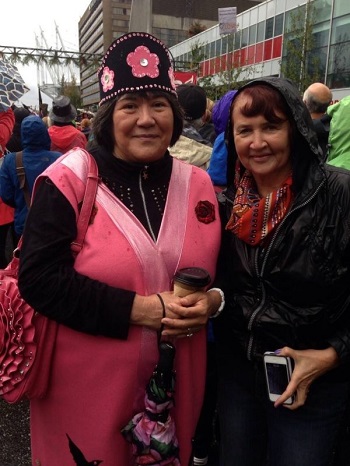
Frances Carlick with Kathleen Lagore, co-pastor of Vancouver Eastside Vineyard Church.
Carlick told me she has felt very supported by Vancouver Eastside Vineyard Church (VEV) and pastors Gordie and Kathleen Lagore:
They were faithful to me. There were so many times I almost walked away, with my own angst, things I was going through that I thought I’m Aboriginal and they wouldn’t understand.
In fact, she said, it was Gordie who arranged her trip to Rome, following a conversation a couple of years ago in which she said she felt called to pray for reconciliation in Rome: “I would just go to St. Peter’s Square in my regalia and drum and pray.”
When he heard there would be a delegation to meet with the pope, Lagore called and asked whether she could go. He received a confirmation call November 11, 2021 – just one day before the deadline for application.
Once Carlick was approved to go, the church and denomination supported her all the way: “I really felt a covering of prayer while I was travelling with the delegation.”
Many of the other delegates asked how Carlick came to be there, on her own. Others had come in groups – Squamish, Métis, Cree and others. She responded:
I am not alone. I got to witness to a Catholic priest. He had worked 30 years up in the Arctic, so he knew some of the Inuit delegation. He came to Assisi with us. I said, “I am never alone, I have the Lord. . . . He thought that I was too young to have gone to residential school, and I was like, no, I’m a grandmother, a great-grandmother – so I took that as a compliment.
She also discovered that a few of the delegates from the Taku River Tlingit had actually attended residential school with her.
Lower Post connection
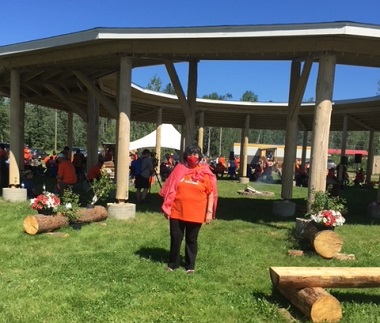
Francis Carlick was at the gathering in Lower Post for the demolition of the residential school in June 2021.
Carlick told me she admires her sister Bernice and brother Walter (named after their uncle), both of whom “carry on the good work on the land” in Lower Post.
She has worked as an educator, supporting Indigenous education programs with the provincial government, and as a teacher working particularly with Indigenous children in Vancouver. She retired from Britannia Elementary School in 2019.
Almost every year she would return home to Lower Post to spend time and work with her people.
Vancouver Eastside Vineyard has become involved too. While praying as part of his introduction to Carlick’s report about her visit to the Vatican, pastor Gordie Lagore said:
Part of our long obedience in the same direction, of course, is finishing well this continuing healing journey of reconciliation with Indigenous peoples in our land, and the healing and resolving and reconciling of the residential schools saga in our nation, and the part that the churches had to play in that.
We’ve been on this 30 year journey. Ceen-ne was God’s ambassador to us, to open the door for us to Lower Post.
Members of VEV have accompanied Carlick – and sometimes gone on their own – to Lower Post most summers since their first visit in 1995.
She told me the people at Lower Post were initially cautious about the VEV visitors. But any gestures toward reconciliation were appreciated, she said, and people began to open up about residential school by the second or third visit: “It was just unbelievable – a real healing experience.”
‘God is not done yet’
“God is not done with this story yet,” Carlick told me. The visit to Rome – following revelations about children buried at the former Kamloops Indian Residential School last year – has awoken a desire to let people know more about the experiences of her mother, her uncle and so many others.
Speaking to the Vancouver Eastside Vineyard, she described what gave her confidence during her time in Rome:
We all had a common story. Every single one of us went to residential school – except the youth that travelled with us. . . . A lot of our people had worked through their healing. And this is what really surprised me about the delegation.
A lot of our people had a measure of healing – and that’s a work of the Lord. They love their communities; some of them had been in leadership for 30 to 40 years. This had been a long journey for all of us, to come to Rome, to really implore the pope for an apology.
Each delegate, she said, had a story. Some were recovered alcoholics who, after residential school, were “brought out into the light – that’s God’s mercy.”
Other people just dedicated themselves to working for our people. They went through a lot of persecution, but they stood, stood, and carried on. To me, that is a miracle, because it’s really tough ground in Native politics.
So much hurt, so much pain, and our people lash out at the leadership. No matter what you try to do to help the people, there’s always a struggle, because that bitterness has been there, and that resentment and all of that.
But we get glimpses of what God is doing, and I believe this trip to Rome was a glimpse of what Father God wanted to happen.
Delegates met to debrief after their time with Pope Francis:
They felt the bitterness, the backlash, that came on Facebook and all of the other media. They just felt, we’ve got to go home and deal with this aspect of the trip. Even though it’s been a highlight, we still have to go home and face our people that don’t have healing yet. Many of those delegates said, “This is where the hard work begins.”
I just felt in my heart, that God has been so gracious to me, to be able to go and share my story. I have had favour in Lower Post with my own people, and God gave me favour on this trip with the Coast Salish delegation.
Carlick arrived home on the same flight as those new friends and one woman urged her to join them as they were welcomed home at the airport with dancing, drumming and singing. “I was blown away by the welcome; it was so good.”
VEV pastor Gordie Lagore was there to pick her up about 1 am. He said, “It was such a holy moment.” He included a clip of the welcome in the video conversation with Frances Carlick on the VEV site.
As we anticipate Pope Francis’s visit to Canada, Carlick believes forgiveness is the key to healing. “I really believe in healing,” she told me, “but you really have to be in the right mindset, to search it out.”
She points out that “diabetes is an epidemic among our people; it comes from trauma in childhood.” She feels her people will benefit physically, as well as emotionally, if they both embrace forgiveness and reclaim their traditional holistic ways of healing, relying on medicine from the land rather than pills.
(She wrote Forgiveness as a Journey for the Sanctuary Mental Health Ministries blog.)
The B.C. Catholic has posted an overview and itinerary of the pope’s visit to Canada.

Thank you for posting this personal account of a very important day – and time in our history. I pray that more people will learn as she has that forgiveness as only the Spirit can bring is essential to the healing journey.